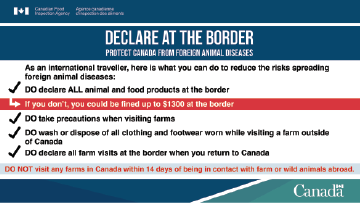Whether you travel for work or pleasure, you have a role to play in preventing the spread of foreign animal diseases like African swine fever (ASF). People such as farm workers, foreign exchange students or hunters who travel to countries infected with ASF could bring back contaminated food, clothing and equipment.
Here's how you can help
- Wash or dispose of all clothing and footwear worn while travelling to a country that is infected with ASF before re-entering Canada
- Declare all animal and food products at the border: neglecting to do so could result in monetary penalties of up to $1300
- Declare it at the border if you've visited a farm abroad
- If you've visited a farm in an ASF-infected country you should not visit a pig farm in Canada for at least 14 days
Refer to our frequently asked questions about ASF to inform yourself about this animal disease.
Awareness toolkit
Everyone has a role to play in reducing the risk of animal diseases. Do your part by sharing this toolkit with your network. You'll find helpful videos, fact sheets, posters and images to help spread the word, not the animal disease.
Pamphlet: Traveller's guide to protect Canada from foreign animal diseases
Declare all animal and food products at the border and take precautions when visiting farms.
Infographic: What you need to know if you plan to travel with a pig
All varieties of pigs, whether kept as pets, companion animals or farm animals, are susceptible to the same serious diseases.
African swine fever poses a significant risk to the Canadian pork industry and the Canadian economy.
Awareness tools from third parties
- World Organisation for Animal Health (WOAH) situation reports for African swine fever
- WOAH awareness tools
- Video: African swine fever – How to stay one step ahead
- Travellers: Don't be the carrier of a deadly pig disease (PDF)
- Transport authorities and check point staff: Don't overlook a deadly pig disease


